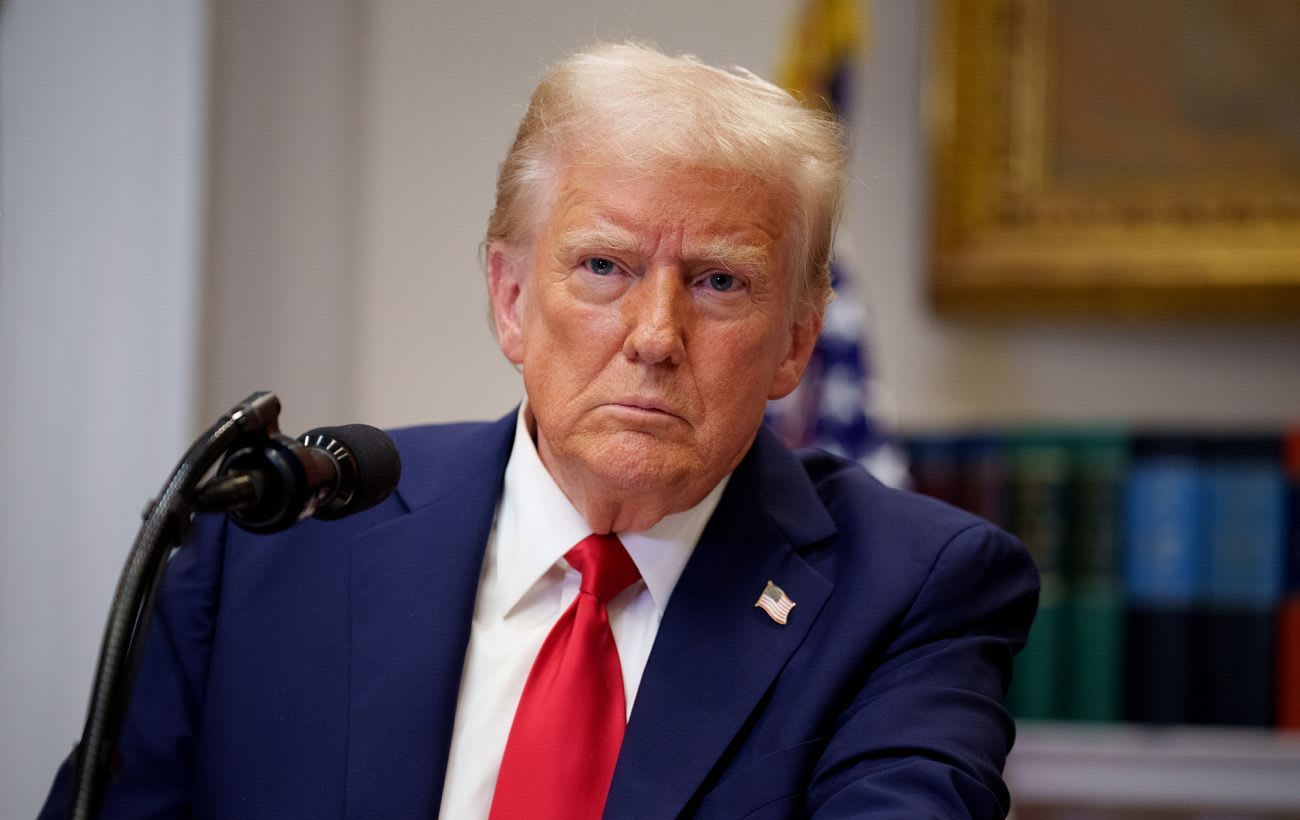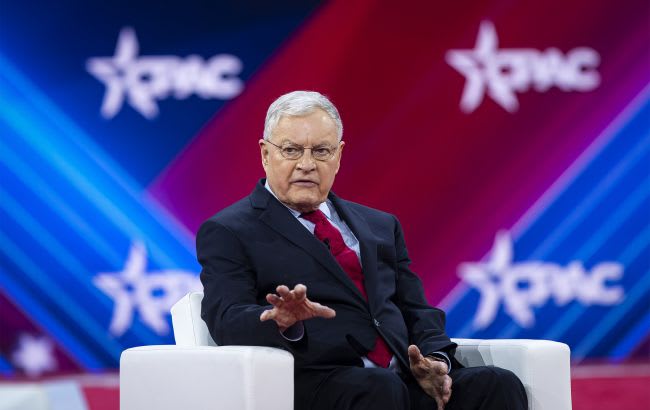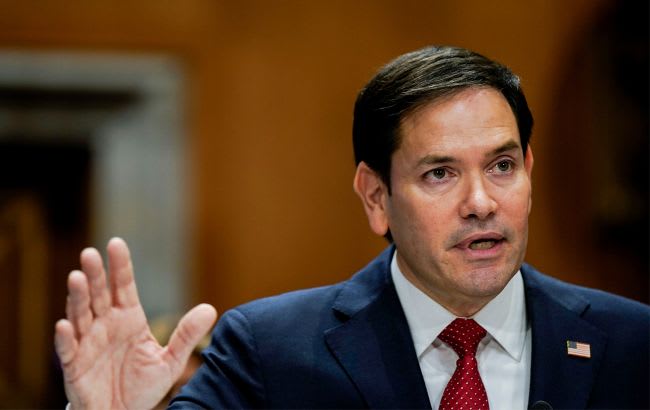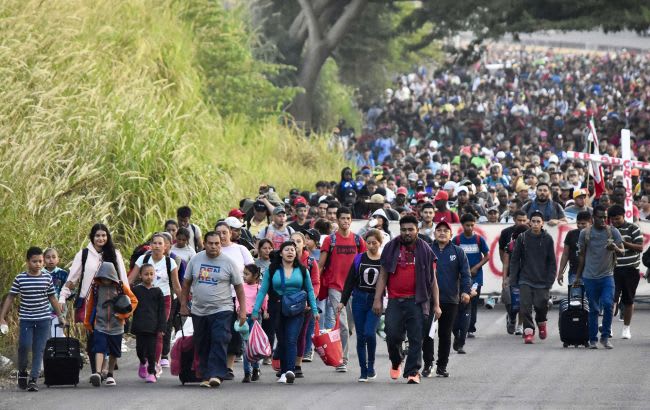Trump in turbo mode: What the new US President did and said in a week

Mr. Donald Trump, the newly appointed US President, has reached the end of his first week in office, and he has not stood idle throughout this period. Just seven days in, he has signed a vast array of executive orders and made several statements concerning an end to Russia's conflict with Ukraine, as well as other global events.
RBC-Ukraine examines Trump's key actions during his first week in office.
Contents
・The conflict in Ukraine finally comes to an end, with Russia ceasing hostilities against its neighbour.
・World politics
・US domestic policy
There has been a cessation of hostilities between Russia and Ukraine.
During his first public address, Donald Trump omitted any mention of Russia's aggression towards Ukraine, but pledged that US influence would "halt all conflict and foster a newfound sense of unity globally."
On January 21, US President Trump spoke to journalists while signing his first executive orders. He mentioned that Ukrainian President Volodymyr Zelenskyy "wants to make a deal". Mr Trump expressed the hope that Vladimir Putin, too, should be prepared for this, as "he's destroying Russia without making any deal".
The US President has ordered his special ambassador for Ukraine and Russia, Keith Kellogg, to bring an end to the conflict within 100 days, says The Wall Street Journal. This marks the first stage in the peace negotiations, which the President aims to oversee personally. As yet, no date has been set for him to travel to Ukraine.
On 22 January, the US president made another statement on Truth Social. Mr Trump wrote that he "loves the Russian people" and has always had a very good relationship with Mr Putin. He also urged the Russian leader to commence talks immediately to bring an end to the conflict before it escalates further.
"If we fail to reach an agreement, I will have no option but to impose significant Tax Increases, Trade Barriers, and Economic Penalties on all Russian exports to the United States and allied countries,” Trump stated.
During his address at the Davos Economic Forum on January 23, the US President expressed a desire to gain China's assistance in bringing an end to the conflict with Russia. He also stated that he aims to lower oil prices, which he believes could be pivotal in halting the war in Ukraine. The US President plans to achieve this by boosting domestic oil production and collaboration with other nations.
"I'm going to request Saudi Arabia and OPEC to reduce oil prices. If the cost of oil fell, the conflict in Russia and Ukraine would cease instantly," said Trump.
Later, Trump's special envoy for Ukraine and Russia, Keith Kellogg, explained that he had actually mentioned a price of £35 per barrel was not specified in their conversation, however, he had been referring to a specific price of $45 a barrel.
It's also anticipated that Donald Trump and Vladimir Putin will have a phone call in the forthcoming period.

Keith Kellogg (photo: Getty Images)
At the same time, Trump hasn't ruled out purchasing American arms for Ukraine by utilising the proceeds from the frozen Russian assets, as relayed by Keith Kellogg in a discussion with Fox News. He stated, "this is a matter for consideration". Nonetheless, according to Kellogg, this will not resolve the issue.
So, in the case of Ukraine, Donald Trump's first week not surprisingly didn't bring about many significant developments, but it's now clearer than ever that his priority is negotiating a “deal” related to the conflict, though the details of what this agreement entails are still vague.
World politics
In a January 23 broadcast with Fox News, Trump stated he would have a considerable amount of work to undertake as a result of various issues during Biden's presidency that shouldn't have occurrred.
Audit of aid
One of Trump's first moves was to put a 90-day halt on financial assistance to other countries. This three-month pause gives the US government the chance to carry out an audit and review the performance of aid programmes against US foreign policy goals. The halt mainly affects aid channeled through the US Agency for International Development, but does not apply to military aid to Ukraine.
The United States National Security Adviser, Mike Waltz, ordered a complete vetting process for dozens of White House staff to guarantee they remain devoted to carrying out President Trump's instructions, rather than undermining them. It's claimed by the Washington Post that in a short phone call with his chief of staff, Brian McCormack, officials were informed that they should vacate the premises immediately. They were told they would only be permitted to re-enter at the request of their superior, a senior director appointed by the Trump administration.
The process of appointing new members to President Trump's team is now well underway. He has the authority to appoint some team members on his own, whilst others require approval from the Senate.
China
On 21 January, President Trump held a press conference in the White House Oval Office and mentioned that he was debating imposing a 10% tariff on all Chinese goods by 1 February. This proposal was one he had floated during his election campaign. Prior to his inauguration, Trump had a phone conversation with Chinese President Xi Jinping.
"The call was thoroughly positive for both China and the United States. I believe we will make considerable progress on resolving several issues together, starting without delay. We covered key topics such as trade, the Fentanyl issue, TikTok, and many other matters. I am confident that President Xi and I will take every available step to create a more peaceful and prosperous world," Trump wrote on Truth Social.
The new US Secretary of State, Marco Rubio, spoke by telephone with his Chinese counterpart, Wang Yi. Among other issues, Secretary Rubio stressed the US commitment to its allies in the region and expressed serious concerns regarding China's actions towards Taiwan and its activities in the South China Sea.
WHO
The United States has pulled out of the World Health Organisation, but under the WHO's founding document, formal withdrawal will not be finalised until 2026, as a one-year notice of intention to leave has been required by the constitution. The US has had criticisms of the organisation since 2020, amid the COVID-19 pandemic, with claims the WHO is controlled by China.
The US politician who instigated the US withdrawal from the WHO at that time was later overridden by Joe Biden.
The United States is the biggest contributor to the World Health Organisation's finances, making up almost one-fifth of its budget.

Marco Rubio (Image courtesy of Getty Images)
Latin America
The US has effectively reclassified Cuba as a state sponsor of terrorism.
US President Biden removed Cuba from the list of countries that support terrorism shortly before the end of his time in office on 15 January. Cuba had been under the Soviet Union's sway since the late 1950s and has since enjoyed close relationships with Russia and China.
The new US president has issued an executive order renaming the Gulf of Mexico, now referred to as the Gulf of America. According to him, the Gulf holds significant importance for the US economy.
US domestic policy
Fighting the “deep state”
Donald Trump issued an executive order to establish a 'Department of Government Efficiency', with tech mogul Elon Musk at its helm. Musk will reportedly be provided with an office in the White House, where a team of approximately twenty individuals will be based. The department's role will be to facilitate the enforcement of executive branch policies. Initially, the plan was for Elon Musk and entrepreneur Vivek Ramaswamy to co-lead the department, however, Ramaswamy has since decided to focus on other matters. According to insights from The Washington Post, the change in plans may be due to tensions between Musk and Ramaswamy.
At the same time, Elon Musk was refused a office in the heart of the White House, by Susan Wiles, the White House chief of staff who made it plain that she dislikes people "who want to work independently or be a star".
Energy
When Trump issued his initial directives, he classified the situation in the US energy sector as an emergency. This decision gave American companies the freedom to access fossil fuels. He also reinstated the federal programme for leasing oil and gas, relaxed restrictions on exporting liquefied natural gas, and removed the prohibition on drilling in US coastal waters, specifically.
Donald Trump has also pulled the United States out of the Paris Climate Accord, the goal of which is to reduce carbon dioxide emissions and tackle climate change. This move will bring an end to environmental protection measures and slow the development of green energy projects while, conversely, giving a boost to certain industrial sectors in the short term.
The US President has put a hold on new federal wind farms until an environmental and economic appraisal is carried out. He has likened wind turbines as eyesores, costly, and detrimental to wildlife. Furthermore, he has cancelled his 2021 executive decree which mandated that by 2030, half of all new vehicles sold in the US must be electric.
TikTok
On his first day as president, the politician put on hold a 75-day temporary exemption for the US ban on TikTok, which had been mandated by a law brought in under Joe Biden. Trump started working on a deal to sell TikTok to a US-based company.
In an interview with Fox News, Trump stated that the media platform is not as significant a threat to US national security, according to supporters of a ban on it.
The president is using a lot of language about targeting young people, it is quite unclear whether this is urgently important to China. The president has limited knowledge of TikTok and hasn't explored its unique content.
ByteDance, the operator of the popular app TikTok, is reportedly seeking a solution to maintain its US presence, with several options under consideration, including the possibility of partnering with an American business.
Migration
He imposed a state of emergency on the border with Mexico. The presidential decree allows for enhanced border control and grants military powers to maintain order on the border. Deportations of illegal aliens from the United States have commenced. Colombia, one of the countries where illegal aliens are being returned, has refused to accept them. As a consequence, he announced a 25% tariff on all goods imported into the US from Colombia; intensified customs checks for Colombian citizens and goods; and economic sanctions against several senior Colombian politicians.
Tighter regulations for securing work visas and residency permits will also be put in place.
Organisations responsible for smuggling illegal immigrants from Mexico to the US have been identified as foreign terrorist entities. This designation provides the US with enhanced resources to tackle them, such as military action and intensified economic penalties. Plans have been put in place to establish special task forces to combat these drug cartels.

Archival picture: Countless migrant party from southern Mexico begin a journey on foot towards the US border (Getty Images)
In a recent executive order, the US president revoked the automatic granting of citizenship to those born within the country's borders. This move aims to reduce one such incentive for undocumented immigrants to enter the United States. Nevertheless, it is currently facing legal challenges from various states, placing its implementation in a state of uncertainty.
The Home Office has temporarily halted certain programmes that allowed immigrants to remain in the UK. Specifically, refugees from Ukraine under the Uniting for Ukraine (U4U) scheme, as well as those from Cuba, Haiti and Venezuela, are prohibited from entering the US.
Artificial intelligence - Stargate
Donald Trump has launched the creation of Stargate, a business focused on artificial intelligence. It is expected that a massive £384 billion will be invested in Stargate over the next few years. The company intends to team up with OpenAI - its key product is Chat GPT – and Oracle, a software creator backed financially by Japan's SoftBank. As part of its plans, Stargate hopes to create around 100,000 new jobs and construct data centres throughout the country.
Pardon for those found guilty of the storming of the Capitol Building
The United States President granted clemency to approximately 1,270 individuals who were found guilty of involvement in the events that took place on 6 January 2021, and instructed the Department of Justice to conclude around 300 other cases that were still pending.
On 6 January 2021, a chaotic scene unfolded when US Congress was set to validate the outcome of the 2020 presidential election. Despite his loss, Donald Trump refused to concede, and a large crowd gathered in Washington following his calls to 'battle for votes'. Unfortunately, some interpreters of these instructions took it as an invitation to melakukan labour the congressional building, resulting in a tragic situation where five people lost their lives.
Only two sexes
A further executive order compelled the government to use the term "sex" instead of "gender," whilst government-issued identifications (including passports and visas) shall be based on a person's "unalterable biological sex as being either male or female." Some executive orders that aimed at encouraging racial equality and combating discrimination against sexual minorities were revoked by Biden's administration.
The information is based on quotes from American politicians, Donald Trump's Presidential executive orders, and reports from various media sources such as Reuters, Axios, Washington Post, CNN, New York Post, and The Wall Street Journal.
Post a Comment for "Trump in turbo mode: What the new US President did and said in a week"